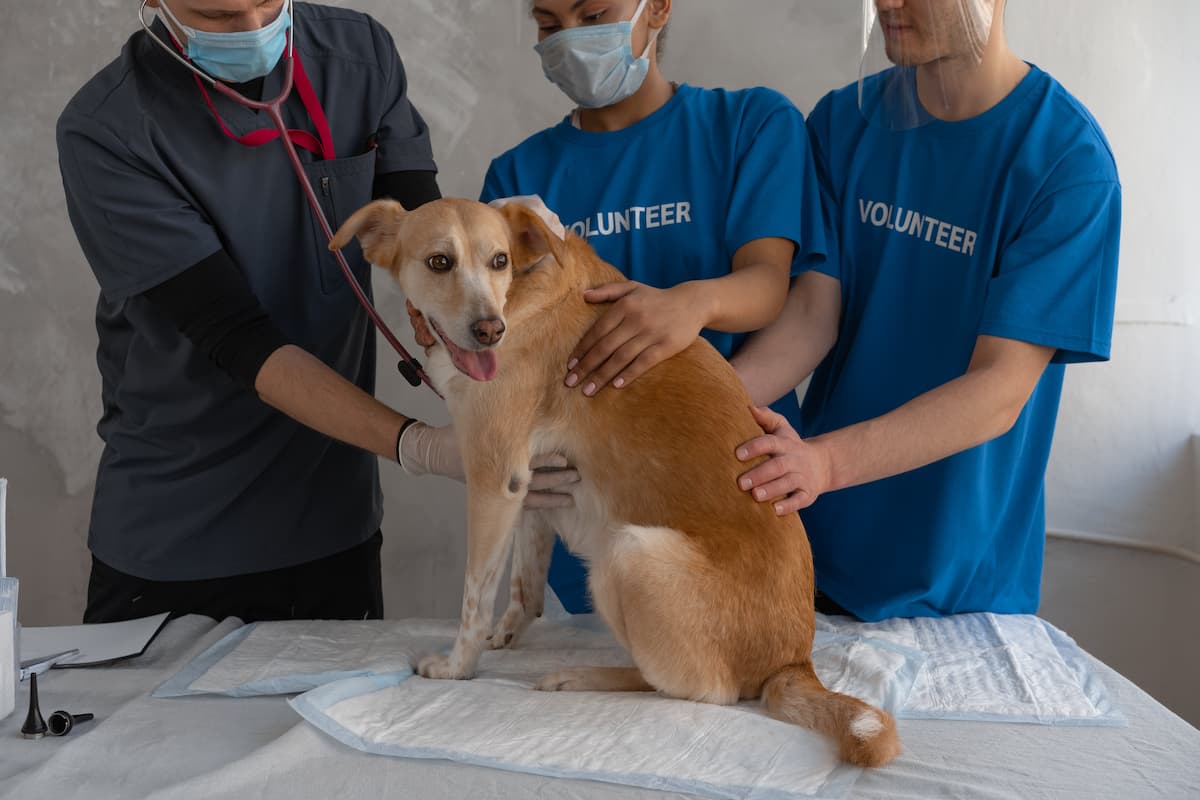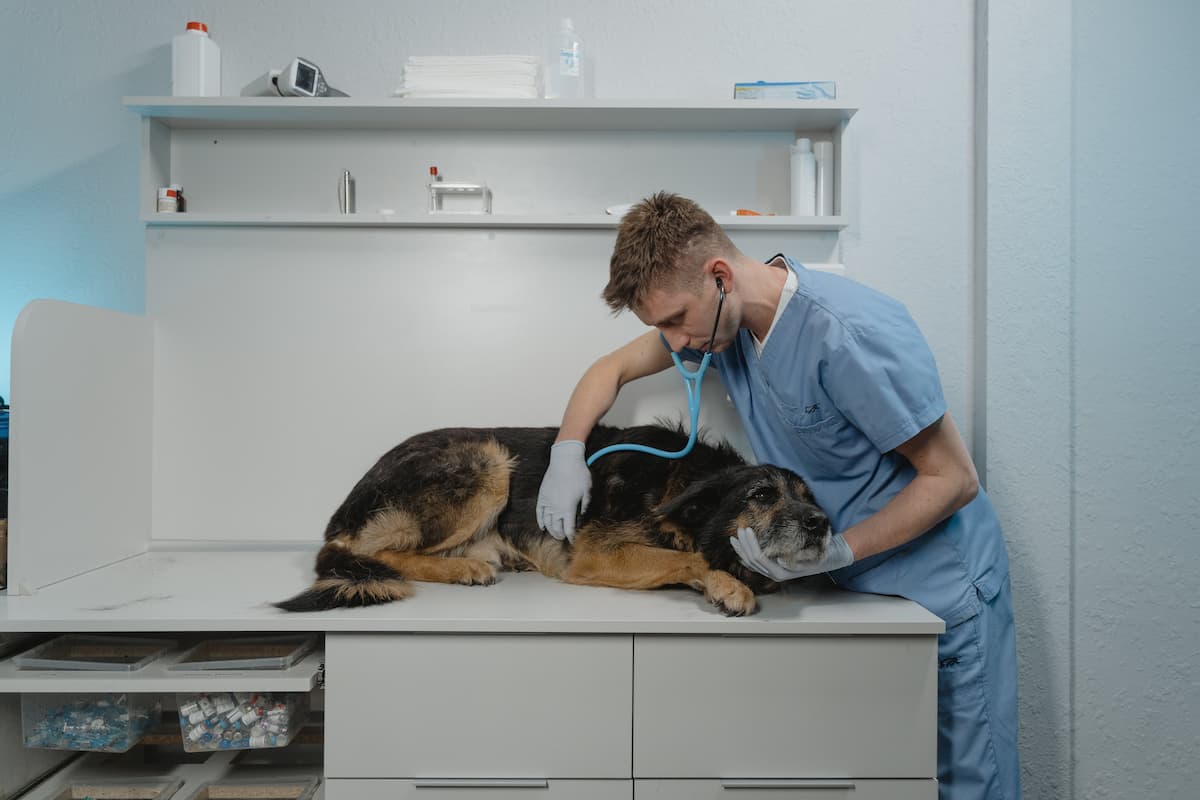Picture this: a bright sunny day at the local park.
Families are enjoying picnics, children are squealing with delight as they climb on the playground equipment, and dog owners are patiently throwing a tennis ball for their furry companions.
It’s a typical scene that personifies joy and togetherness… until a sudden realization strikes them all.
The question arises in their minds: “Hey, wait a minute! Why do dogs get rabies shots?”
The park falls silent, as everyone is left pondering this canine conundrum.
Read to learn why it is important for your dog to get its rabies shot.
What is Rabies and How Does it Spread?
Rabies is a highly contagious viral disease that affects both animals and humans.
It is mainly transmitted through the bite or scratch of an infected animal, most commonly dogs.
This infectious disease attacks the central nervous system and, if left untreated, can be fatal.
That’s why it is crucial for dogs and other animals to receive rabies shots regularly to protect them from this deadly disease.
So, you might be wondering, why do dogs get rabies shots?
Well, let me break it down for you.
Rabies shots, also known as vaccines, are a preventive measure to keep our furry companions safe.
The vaccine contains a weakened or inactivated form of the virus, which stimulates their immune system to recognize and fight against it.
By vaccinating your dog, you are essentially training their body to defend itself against rabies, in case they ever come into contact with an infected animal.
But it doesn’t stop there!
Rabies shots not only protect our pets but also contribute to the overall public health.
Dogs can contract rabies easily and, if they are not vaccinated, they can become carriers of the virus.
Imagine the potential danger that could pose to humans!
By ensuring that our canine friends are up to date with their shots, we are reducing the risk of rabies spreading to other animals and, ultimately, to us.
It’s a win-win situation for everyone involved – fewer infections mean a safer environment for both humans and pets.
Why Rabies Shots are Essential for Your Furry Friend
1. Prevention is Better Than Cure
-
- Did you know that rabies is an incurable viral disease that affects the central nervous system of animals, including humans?
- Once symptoms appear, it’s often too late, and the outcome is fatal.
- Vaccinating your dog against rabies is a cost-effective way to prevent a life-threatening illness. Treatment for rabies can be extremely expensive and often ineffective, so prevention is undoubtedly the better option.
2. Protecting Your Dog and Yourself
-
- Rabies is primarily transmitted through the bite of an infected animal, such as raccoons, bats, skunks, or even other dogs that carry the virus without showing symptoms.
- By vaccinating your dog, you’re not only protecting them but also safeguarding yourself, your family, and others from potential exposure to this dangerous virus.
- Remember, prevention is key when it comes to rabies, as it can have severe consequences for both animals and humans.
3. Legal Requirement and Peace of Mind
-
- In many states and countries, rabies vaccinations for dogs are mandatory by law.
- By keeping up with your pet’s rabies shots, you are not only fulfilling your civic duty but also avoiding legal penalties.
- Additionally, having your dog vaccinated provides you with peace of mind, knowing that you’ve taken all necessary steps to ensure their well-being and the safety of those around you.
Additional Steps for Ensuring Your Dog’s Health
Getting your dog vaccinated against rabies is not only a legal requirement in many places, but it also offers important benefits beyond preventing the disease.
Regular vaccinations help boost your dog’s immune system, making them less susceptible to other illnesses.
Moreover, by keeping your dog’s vaccinations up to date, you can ensure they receive a comprehensive examination by a veterinarian, who can detect any underlying health issues early on.
Remember, prevention is always better than cure, and getting your dog their rabies shots is an essential part of a proactive approach to their overall well-being.
In conclusion, dogs get rabies shots to protect them from the life-threatening disease and to prevent its transmission to other animals and humans.
These vaccinations are not only legally required but also serve as an opportunity to take proactive measures to keep your pet healthy.
By staying vigilant and up to date with your dog’s vaccinations, you’re not only safeguarding their immediate health but also providing them with long-term protection against other potential illnesses.
So, roll up your sleeves, make that appointment with your veterinarian, and give your furry companion the gift of good health.
FAQ
Q: What is rabies, and why should I be concerned about it as a dog owner?
A: Great question!
Rabies is a serious viral disease that affects the nervous system of animals, including dogs.
It can be transmitted to humans through bites or scratches from infected animals, posing a significant risk to both pets and people alike.
Q: Is rabies common among dogs?
A: While efforts to control rabies have greatly reduced its prevalence, it’s still a concern, particularly in some regions of the world.
Vaccinating dogs remains a crucial strategy to prevent the spread of this deadly disease.
Q: How does a rabies shot protect my dog?
A: When your dog receives a rabies shot, it is being vaccinated against the rabies virus.
This means that if your dog is exposed to the virus, their immune system will be prepared to fight it off more effectively.
If they were to contract rabies, the vaccine significantly improves their chances of survival.
Q: How often should my dog receive a rabies shot?
A: The frequency of rabies vaccinations may vary depending on your location and local regulations.
Generally, puppies receive an initial series of shots, and then a booster shot is given one year later.
Afterward, the vaccine is usually administered every one to three years, depending on the vaccine type and local guidelines.
Q: Are there any side effects from rabies vaccinations?
A: Like with any medical treatment, there can be potential side effects, but they are typically minor.
Some dogs might experience temporary soreness around the injection site or show mild flu-like symptoms.
Severe reactions are rare and usually related to allergies or previous adverse reactions.
It’s always a good idea to consult your veterinarian if you have any concerns.
Q: Are there any risks in not vaccinating my dog against rabies?
A: Absolutely.
If your unvaccinated dog happens to come into contact with a rabid animal, they can easily contract the disease.
Rabies is life-threatening, and sadly, there is no cure once symptoms appear.
Moreover, in many places, it’s required by law to vaccinate your dog against rabies to protect public health.
Q: Can my indoor dog skip rabies vaccinations since it doesn’t go outside?
A: Even if your dog mostly lives indoors, vaccinating them against rabies remains crucial.
While the risk may be lower, unexpected situations, like an intruding rabid animal wandering inside your home, can occur.
It’s always better to be safe than sorry, protecting both your pet and your family’s wellbeing.
Q: Are there any additional steps to prevent rabies in dogs?
A: Apart from vaccinations, it’s essential to keep your dog away from wild or stray animals that may carry the virus.
Supervision during walks and avoiding encounters with unknown animals is key.
Also, in some regions, it’s mandatory to keep dogs on a leash and get them licensed, ensuring they have an identification tag in case of any unforeseen circumstances.
Q: Can humans get vaccinated against rabies?
A: Absolutely!
Humans can also receive rabies vaccinations, particularly in situations where there has been exposure to an infected animal.
If you’re concerned about your own safety, it’s always best to consult a healthcare professional who can provide guidance and take the necessary precautions.
Q: So, to wrap it up, why do dogs need rabies shots?
A: Dogs need rabies shots for their own protection and the safety of the larger community.
It’s a responsible action that can save their lives and prevent the spread of rabies to other animals and humans.
By keeping our beloved furry companions vaccinated, we’re working towards a world where rabies becomes a thing of the past.
The Bottom Line
Rabies is a scary and deadly virus that can infect any mammal, including humans.
Thankfully, with the development of vaccines, we can protect our dogs and ourselves from this dreadful disease.
Remember, prevention is always better than cure!
By getting your pup vaccinated, you not only provide them with a shield against rabies but also contribute to the overall safety of your entire community.
It helps create a barrier against the spread of the virus, making sure it doesn’t reach humans or other animals, like bats or raccoons, which are often carriers.
Now, I know some of you might be wondering about the potential side effects of these shots.
Well, like with any medication, there can be some mild reactions, such as soreness at the injection site or a slight fever.
But these are temporary and a small price to pay for the protection it provides.
So, whether your pooch is a city slicker or a country dweller, it’s essential to consult with your veterinarian and make sure they are up-to-date on their rabies shots.
Let’s keep our four-legged friends safe, happy, and rabies-free!
Remember, folks, when it comes to rabies, it’s always better to be safe than sorry.
So go on, give your dog a pat on the back and a treat for being the responsible pet parent that you are.
Take care, and until next time, keep wagging those tails!











